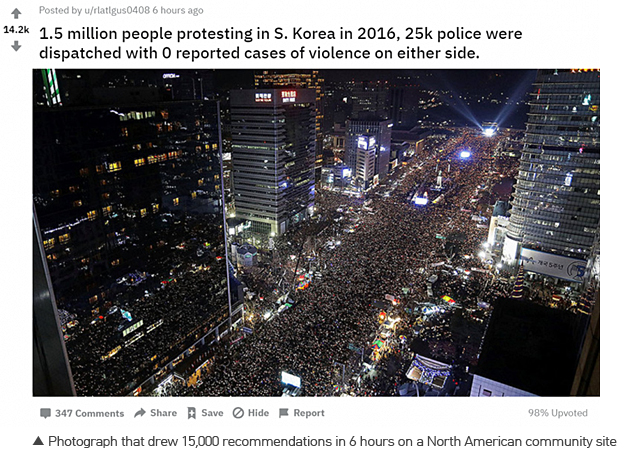Essay Contest Result
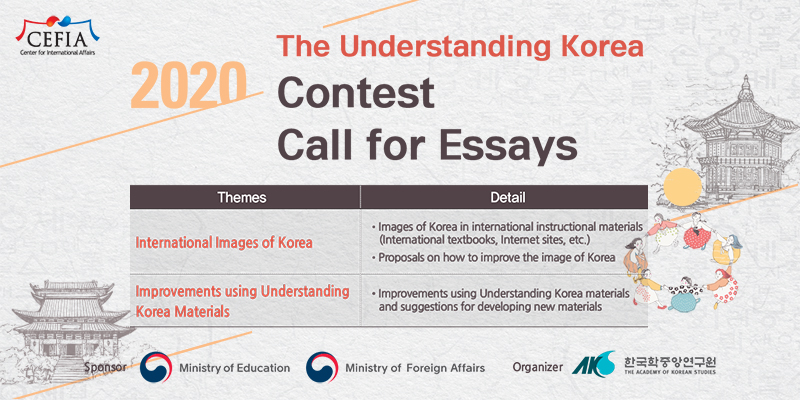
Korea that Speaks Up, Suggests
Joseph Conrad's famous novel "Heart of Darkness" which accused white supremacy and savagery of imperialism has exerted considerable influence on the cultural industry, including Hollywood films, games, literature and music records. In the 1970s, the novel was deconstructed by Nigerian author Chinua Achebe, an incident destined to have a big impact beyond the cultural community. Achebe revealed that the novel pointed to the barbarism of Africa and that white supremacy and imperialism are 'as barbaric as African blacks'. He argued that Africa was still 'spoken about' in the Western literature. As Achebe mentioned, Africa reproduced in the Western cultural world in the outside perspective was only used as a yardstick for measuring the savagery of the internal Western culture. The West failed to reproduce the dynamic heartbeats of Africans that have pounded the vast continent for thousands of years. Nevertheless, "Africa that speaks up" gained power as Achebe's novels such as "Things Fall Apart" were well received and joined the rank of the world classics. In his novels, Africa was portrayed as a land with a history which cherishes its own beauty, norms, cultures and lifestyles, not a barbarian land as portrayed in the European perspective. Characters in Achebe's novels spoke of Africa as told by Africans, and they not only influenced the revival of postcolonial literature, but also prompted reevaluation of the non-Western culture including African. Wouldn't this transition from an Africa that is being spoken about to an Africa that speaks up shed light on our study of Korea's image abroad? I would like to use these pages to write about, with whatever poor writing skills I have, observation of the changes in Korea's image abroad and ways to develop it into a sustainable one.
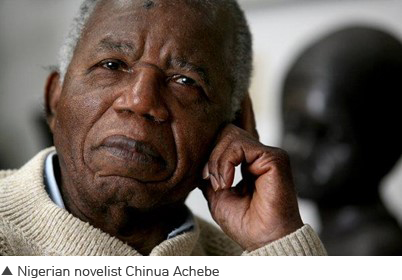
Until the early 1960s, Korea could not raise its own voice in the world, not least the North American region where I was living. The small country of the East divided into the South and North remained a light 'reading material' one gets past in history class on the Cold War, or a relatively unknown place sitting next to the developed Japan. Even in the 1970s when Korea began to emerge on the international stage as one of the four dragons of Asia, Korea's image was not identified with its historical entity. For its growth potential, Korea used to be an object of analyses based on economic logic. Little else was known about the country. One undeniable fact is that the spread of taekwondo greatly contributed to promotion of Korea. Foreign cultural media including Hollywood films portrayed taekwondo, along with kung fu of China and kendo of Japan, as a martial art being practiced in a mysterious Eastern country. Taekwondo became the overriding symbol of Korea, and martial artists in taekwondo uniforms were the most common image of Korea that rarely appeared in the Western popular culture. It would be reasonable to believe that such a situation resulted not from the inherent limit in taekwondo's influence but from the meagre international cultural exchanges Korea had with the outside world and the limit in the discourse of the Western world. Taekwondo and related culture were not important to the foreign media that formulated Korea's image. An 'Oriental martial art,' taekwondo was one of the components of the great Orientalism. The mechanism of Orientalism is based on a binary opposition that attempts to tell one from the other, so no further distinction was required or made the moment the West and the East were separated. China, Korea and Japan were mixed up in that huge conceptual machine in which there were no differences. Korea was still being spoken about.

One cannot say that the so-called Korean Wave which has emerged in the late 2000s, including K-pop, K-drama, e-sports and hansik, came up all of sudden. The phenomenon was definitely the result of state support for a long time of period and efforts of many individuals. What's noteworthy is that around that time, Korea began to emerge on the international stage as a country that speaks up, not one being spoken about. Korea, which had been a vague component of Orientalism that distinguished the West from the East, began to export its own identity. Previously, limited texts, including taekwondo, were reproduced by Western hands, but Korea began to produce, promote and distribute its history, culture and lifestyle on its own. At a time when North America and Europe had only a vague idea of professional gamers, Korea built esports as a new sports genre that draws as many as 100,000 spectators to each game. K-pop, which combined many music genres and which was quickly transformed into watching music, is no longer a minor music genre. It has become a global standard for expressing youth. K-drama, which grew up on the strength of passionate response from countries with Confucian culture like China and Japan, is solidifying its base as a global cultural content by absorbing North American and European styles. The Korean-style Internet personal broadcasting has created new content (such as mukbang, or eating show) riding the wave of the growth of YouTube. Korea is no longer represented by a single image or a hazy Oriental fantasy in most international Internet forums and cultural contents. Now Korea's images are more diverse and specific, and they represent a scientific country that possess up-to-date industries, a dynamic, incessantly changing country that creates novelty, and a country with a long history and tradition.
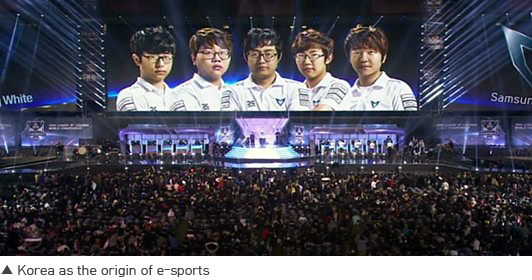
Those overseas images of Korea have undergone changes at a tremendous speed during the past decade. But would it be too greedy to say that we have seen the possibility of enhancing Korea's image further amid such changes and that we should pursue that possibility? What else do we need besides not being a topic spoken about by others? I dare to take this opportunity to say 'yes.' Even my narrow insight calls on Korea to dream of taking a leap to become a Korea that suggests from a Korea that speaks up, and I believe there is a high possibility.
There may be a question of the need to take a step further from a Korea that speaks up. It is because being an entity that speaks for itself does not in itself rule out the logic of distinction based on binary opposition. In other words, it means that Korea may be more vulnerable to the danger of speaking for binary opposition. Discourse on our indigenous things and those that are better than others' easily combine with the linear theory of historical development or the discourse on deviated nationalism that still hangs in the shadow of civilization. Speaking based on this binary opposition naturally or secretly recreates the mechanism of Orientalism that undercut others. One good example is the Japanese media which tried to publicize self-claimed excellence of the Japanese language in the midst of the spread of the novel coronavirus. What an unreasonable logic is it to insist that Japan could check the infection of the coronavirus because people speaking Japanese spit out less saliva than those who speak English? This kind of speaking is based on a binary opposition Japan made up artificially while surreptitiously undercutting everything what is not Japanese. What is the difference between a barbaric exterior built to prove excellence of an internal group and its self-pride, and the Eurocentrism which engaged in barbarism in order to prove superiority of the old West? The floods of images based on this binary opposition, as the case of Japan did, not only cause international anger but also could quickly destroy the state values that have been accumulated. It should be reminded that egocentric images that are called "gukppong," a Korean word for jingoism, have emerged in Korea too. Contents showing off Korea based on provocative and artificial binary opposition are being posted on YouTube, with some even mobilizing foreigners. One good thing is that the production of the national image based on the binary opposition faces criticism. Such a sentiment can be seen in the fact that the word "gukppong" has derogatory connotation. Most of all, another important reason for Korea to take a step forward from a Korea that speaks up is that doing so can refine the national image of Korea as a production place of global discourse, not just cultural products.
There may be a question of the need to take a step further from a Korea that speaks up. It is because being an entity that speaks for itself does not in itself rule out the logic of distinction based on binary opposition. In other words, it means that Korea may be more vulnerable to the danger of speaking for binary opposition. Discourse on our indigenous things and those that are better than others' easily combine with the linear theory of historical development or the discourse on deviated nationalism that still hangs in the shadow of civilization. Speaking based on this binary opposition naturally or secretly recreates the mechanism of Orientalism that undercut others. One good example is the Japanese media which tried to publicize self-claimed excellence of the Japanese language in the midst of the spread of the novel coronavirus. What an unreasonable logic is it to insist that Japan could check the infection of the coronavirus because people speaking Japanese spit out less saliva than those who speak English? This kind of speaking is based on a binary opposition Japan made up artificially while surreptitiously undercutting everything what is not Japanese. What is the difference between a barbaric exterior built to prove excellence of an internal group and its self-pride, and the Eurocentrism which engaged in barbarism in order to prove superiority of the old West? The floods of images based on this binary opposition, as the case of Japan did, not only cause international anger but also could quickly destroy the state values that have been accumulated. It should be reminded that egocentric images that are called "gukppong," a Korean word for jingoism, have emerged in Korea too. Contents showing off Korea based on provocative and artificial binary opposition are being posted on YouTube, with some even mobilizing foreigners. One good thing is that the production of the national image based on the binary opposition faces criticism. Such a sentiment can be seen in the fact that the word "gukppong" has derogatory connotation. Most of all, another important reason for Korea to take a step forward from a Korea that speaks up is that doing so can refine the national image of Korea as a production place of global discourse, not just cultural products.
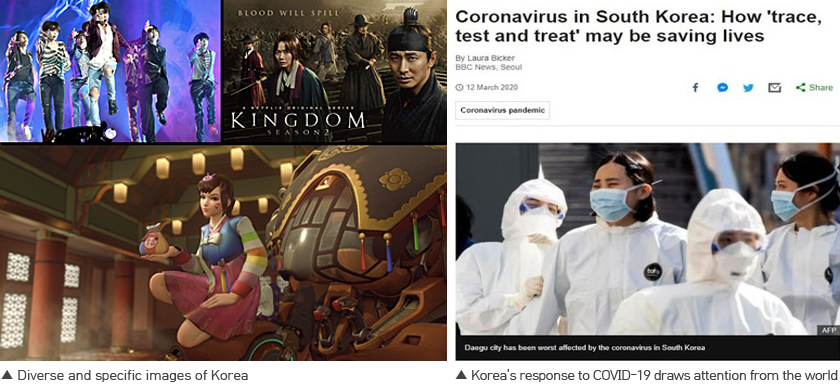
What is a Korea that suggests? It refers to Korea as a producer or supplier of a solution to what the world needs. As an advanced country, Korea in 2020 should be able to suggest a blueprint for the future to developing countries and warn them about the adverse effects of development, and also suggest to other developed countries a solution to transnational problems. This, in reality, is not what can happen in the distant future, but something that we are achieving at this moment. The potential for further development was already confirmed by the images of Korea reproduced overseas. A case in point is Korea's response to the coronavirus outbreak that has drawn fresh attention from the world. Korea is the only country in the world that controls the infection of the coronavirus almost perfectly even without blocking entry and quarantining citizens. Korean diagnostic equipment was exported to 106 countries, including Russia and the United States, and Korean diagnostic equipment was responsible for 70 percent of all tests conducted in Europe. Now Korean diagnostic equipment is essential for the coronavirus quarantine system in most countries around the world. Besides, countries that lack masks and other quarantine supplies are asking for Korea's help. The Korean government is accordingly providing foreign countries with quarantine supplies. The Korean way of responding to COVID-19 such as the use of diagnostic equipment and quarantine supplies, aggressive tracking and quarantine, evacuation of Koreans from overseas, and supply of masks for Korean War veterans and overseas adoptees have become a unique practice in coping with COVID-19. The adjective "Korea" which has drawn attention due to the pandemic, has a slightly different implication from the new Hallyu craze. While the Korean Wave appealed to the world with products consumed and distributed in the cultural market, Korea is now suggesting to the world a manual to cope with transnational disasters.
The popularity of BTS, which has a huge fandom distinguished from those of other K-pop groups, stems from the fact that the boys' band speak of the psychology and self-consciousness of young people around the world. BTS uses their music to suggest what young people who experienced suppression and alienation need and how to love themselves or how to confront the conventional wisdom of society. The massive candlelight vigils in Korea in 2018 provided people around the world with a hopeful precedent for the restoration of popular sovereignty through peaceful demonstrations. A similar message was delivered through the anti-racism protests in the U.S. triggered by the death of George Floyd. The film "Parasite" recognized by Cannes Film Festival and the Academy Awards is an example of Korea that can suggest a solution. The film calmly presents a discourse on social polarization that has been troubling developed countries like Korea. Audiences all over the world came up with as different responses as their nationalities, and the discourse on the transnational issue drew attention from the global popular culture. The example of Korea that suggested such a global discourse can be found in our past.
During the past two decades, Korea has undergone a drastic shift from a country spoken about to a country that speaks up. Korea is no longer a small and insignificant country in the East, nor an unlucky country in the corner of the Cold War history. It is no longer a country that is reproduced in distorted forms in someone else's perspective. A brand with original identity and distinctive image, Korea is associated with symbolic words such as innovation, youth, democracy, flexibility and up-to-date technology on the international stage of the 21st century. The Korea that speaks up could never have been born without all the individuals who devoted themselves and the state policies that supported them. It is fortunate that we are living in this time of possibility made by those efforts, although it comes as a heavy responsibility. The proposition that can be the goal of the new era – raising the prospect of Korea without falling into artificial self-pride based on binary opposition – appears complicated for no reason. It seems not complicated, however, if we see what we have achieved and reactions from the world. Will Korea continue to do as well as she has done so far? I believe so and I would like to end my humble article holding on to the belief.
The popularity of BTS, which has a huge fandom distinguished from those of other K-pop groups, stems from the fact that the boys' band speak of the psychology and self-consciousness of young people around the world. BTS uses their music to suggest what young people who experienced suppression and alienation need and how to love themselves or how to confront the conventional wisdom of society. The massive candlelight vigils in Korea in 2018 provided people around the world with a hopeful precedent for the restoration of popular sovereignty through peaceful demonstrations. A similar message was delivered through the anti-racism protests in the U.S. triggered by the death of George Floyd. The film "Parasite" recognized by Cannes Film Festival and the Academy Awards is an example of Korea that can suggest a solution. The film calmly presents a discourse on social polarization that has been troubling developed countries like Korea. Audiences all over the world came up with as different responses as their nationalities, and the discourse on the transnational issue drew attention from the global popular culture. The example of Korea that suggested such a global discourse can be found in our past.
During the past two decades, Korea has undergone a drastic shift from a country spoken about to a country that speaks up. Korea is no longer a small and insignificant country in the East, nor an unlucky country in the corner of the Cold War history. It is no longer a country that is reproduced in distorted forms in someone else's perspective. A brand with original identity and distinctive image, Korea is associated with symbolic words such as innovation, youth, democracy, flexibility and up-to-date technology on the international stage of the 21st century. The Korea that speaks up could never have been born without all the individuals who devoted themselves and the state policies that supported them. It is fortunate that we are living in this time of possibility made by those efforts, although it comes as a heavy responsibility. The proposition that can be the goal of the new era – raising the prospect of Korea without falling into artificial self-pride based on binary opposition – appears complicated for no reason. It seems not complicated, however, if we see what we have achieved and reactions from the world. Will Korea continue to do as well as she has done so far? I believe so and I would like to end my humble article holding on to the belief.
